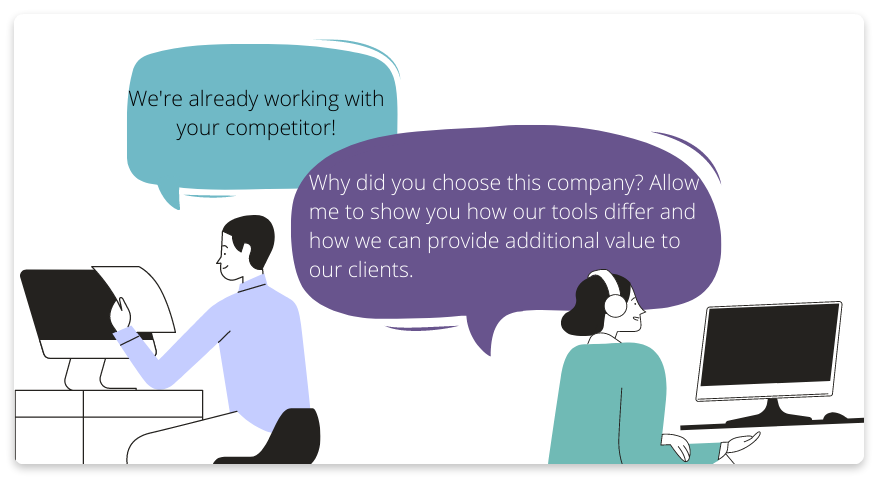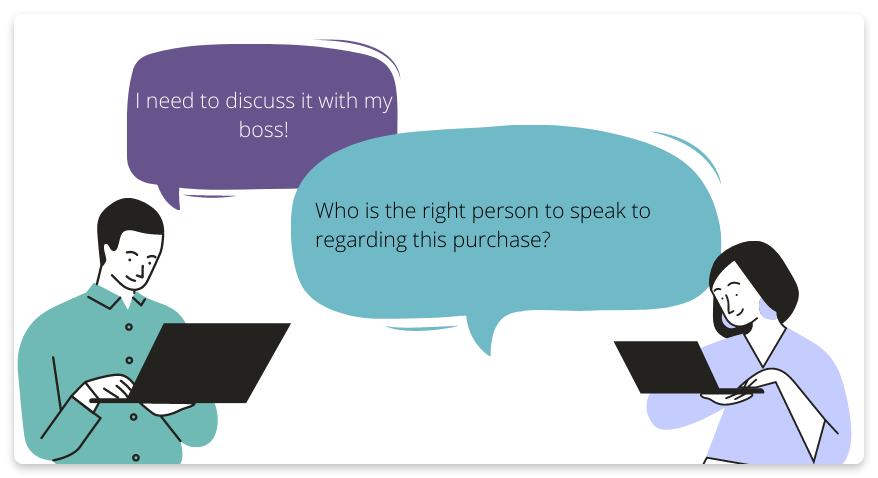“I had a bad experience with this product.”
“It’s too expensive for us.”
“Now’s not a good time.”
We can imagine your frustration. You’ve spent weeks or even months converting a prospective client. They were ready and willing. And then they suddenly object to your sales offer. It might feel like someone just ripped the carpet from under you.
You may even think: What is wrong with my solution?
Don’t worry; sales objections are perfectly normal. And while their ‘no’s’ might be unavoidable, you know your product or service’s value. And you will deal with their resistance and get closer to crossing the sales conversion finish line.
We’ll show you how! Let’s discuss the most common sales objections you may get from your prospects and ways to handle them.
Outline:
What are sales objections and objection handling?
Of course, we’ll start with a little bit of theory.
A sales objection is a rebuttal from your prospect concerning your product or service, which states why they won’t buy it.
If you are just opening the doors of a sales process and trying to draw the line between sales objections and rebuttals, keep in mind that they are synonymous terms used interchangeably.
However, there is a difference between sales objections and brush-offs. Sales objections are rebuttals, something like, “We don’t need your product because we are happy with another vendor.” Brush-offs are dismissals, such as “I don’t want to talk to you, goodbye.” Unlike brush-offs, you should take sales objections seriously and learn how to handle them.
Handling objections in sales means responding to a prospect’s concerns in a way that mitigates their resistance to buy and moves the deal forward.
How to overcome objections in sales
We are almost here. Before we jump into the world of sales objections and possible solutions, here are some general tips on what you can do to withstand the prospect’s resistance:
1. Engage in conversation
About 86% of prospects want to be able to ask in-person questions before buying. Let them ask. Give your leads time and space to speak out.
One day, you’ll be able to foresee what may prevent them from purchasing your product. Listen to or read their concerns with a genuine interest and be ready to stretch out your helping hand.
2. Don’t be afraid to clarify
Keep in mind that sales calls and emails are the best friends of misinterpretation. Prospects may tell you one thing, you’ll understand it differently, and vice versa. That’s why be ready to clarify your lead’s message by rephrasing their concerns. If there is anything you haven’t fully understood, let them correct you. Remember: the dialogue rules!
3. Be serious about sales objections
If your prospects feel any signs of disinterest from your side, they’ll suspect you of pitching harshly. Believe me, as soon as they do, they’ll turn their back on you.
4. Confirm you are doing it right
Show your leads that overcoming objections is one of your top skills. Make sure they appreciate how you are dealing with their rebuttals before moving them forward in the sales cycle.
5. Avoid a backfire effect
One of the biggest sales mistakes is a backfire effect — defending your offer by all means as soon as you face an objection. Eventually, the prospect becomes defensive and completely reluctant to your solution.
To overcome a sales objection, try to stay supportive. Be empathetic and smart enough to agree with a lead’s prior decision before you smoothly shift them to the new reality, which demands a new decision — in favor of your solution.

Common sales objections and responses to them
No matter what you are selling, someone will always be dissatisfied with your product’s features. Someone won’t like the price. And someone won’t be ready to buy at all. But if you know how to deal with the most common objections in sales, you can be invincible.
We’ve divided them into 6 groups depending on the factors that prevent prospects from considering your offer:
- Sales objections about price and budget
- Sales objections about trust
- Sales objections about need/interest
- Sales objections about competition
- Sales objections about decision-making power
- No response at all
Let’s dive in!
Sales objections about price and budget
1. “Your product/service is too expensive.”

That’s the most common objection, but it’s still challenging for 35% of salespeople. Many sales reps make the same mistake — they try defending the price, which has a backfire effect. Never do this. The moment you start concentrating on the price, you lose your sales authority.
How to handle a sale objection: Stay away from stuff like this:
- “I don’t think it’s so expensive.”
- “But we are cheaper than [Competitors].”
- “It isn’t that much.”
Instead, put yourself in your prospect’s shoes. Imagine you want a solution to your pain points but don’t want to spend a significant sum of money on it. No one wants to do it unless they are sure that they wouldn’t have to worry about their problems again.
Focus on the benefits the prospect will get from your offer. For example:
|
I understand your position. Just let me do some counting for you. This solution will help you run your lead generation process automatically. You’ll be able to look for your potential leads on LinkedIn. This source will bring you a bigger quality customer base than social media ads, on which you are spending lots of money at the moment. As a result, you’ll spare a considerable amount of funds and time for your team to focus on other important tasks. |
2. “I don’t see the potential for ROI.”

If your clients don’t see it, then why not show it?
How to handle a sale objection: Learn more about your lead’s business to show you are well aware of what’s going on with their company. Service it with numbers and come up with the response like this:
|
As far as I know, your company has earned about [How much] last year. What if I say this solution will help you increase your conversion rate by [%], which will lead to higher ROI than a year ago. If you could share what high ROI means to your business this year, I would prepare calculations on how much you may expect to earn if you implement this tool. |
3. “We don’t have a budget.”

Such common sales objections are a real pain in the neck. They come in all forms and shapes:
3.1 “We have no budget at all.”
If you target small businesses, they might not have enough resources to afford your product right now.
How to handle a sale objection: Evaluate a company’s growth level and find out how you can help your prospect get to the point where your solution will be a good fit for them. That’s how your response to the potential customer may look like:
|
Thank you for sharing that with me. I don’t mean to put pressure on you at all. Just let me show how our product can be of value for meeting your goals. You might want to take it into account before your new budget is approved. |
3.2 “We have no budget left for the current year.”
It seems like your prospective clients experience troubles that need a quick solution. Any postponing may cost them even more pain.
How to handle a sale objection: You can help your prospect secure the necessary budget from their executive sponsors. Or you can suggest getting back to the conversation when their funds return:
|
Thank you for sharing this information with me. Our goal is to initiate the dialogue between our companies, so I suggest planning our conversation as soon as you reach a point when there is a budget available. What if I contact you [Date/period] and we discuss the offer in detail? |
3.3 “We need to allocate money for something else.”
Good news: such sales rebuttals don’t mean the company isn’t going to buy your product at all. Your prospect just doesn’t consider your offer a priority.
How to handle a sale objection: You have a green light to provide specific cases of how your lead’s competitors benefited from using your solution. And if you show your prospect how much money they will save with your product, you’ll strike a double blow to their indecision to give your solution a try. Bless the numbers!
That’s how your response may look like:
|
I understand. In fact, we have recently worked with two other companies just like you. They had had other priorities before we offered them a free trial. After having used our lead generation tool for two months, they were able to save about [How much] on new prospects acquisition and eventually invested this money into promotional campaigns. |
Sales objections about trust
4. “I’ve never heard of your company.”

People appreciate cooperating with businesses they know. And yes, this is a challenge for sales reps to win a prospect’s heart at once.
How to handle a sale objection: Don’t get upset if you feel resistance from your lead in the beginning. This is not the time to pitch; this is the time to get acquainted and provide a brief overview of your value proposition. For example:
|
We’re a company that offers special tools to improve the visual design of your ads. I want to speak with you about your current design team’s performance and see if we can help you streamline the design process. |
5. “We had an unpleasant experience with a similar product.”

Bad experience usually has long-lasting consequences. Buyers don’t want to fall into the same trap. You might be 100% sure your product is better than the one that caused so many troubles to your prospect before. But if you rush with your sales pitch, they most likely wouldn’t want to hear about you anymore.
How to handle a sale objection: Sympathize. Let your prospect feel your support and understanding of their situation. This will help you build the trust and rapport needed to go on selling.
Ask them what they think went wrong with the previous solution. Remember all details and phrases they use. Only after that you can start speaking about your product. Using their words, underline how their experience with your offer will differ from the one they would like to forget:
|
It’s so sad to hear you had a negative experience with the previous purchase. There might be something that didn’t meet your expectations, right? May I ask you what, in your opinion, went wrong? |
6. “I’ve read some negative reviews about you.”

“Any feedback is better than no feedback,” they say. Well, not always. Negative feedback can spoil your image, and it makes it difficult to bounce back from it.
How to handle a sale objection: Don’t try to defend yourself. No backfire effect, remember? First, ask a prospect to share the source where they found a bad review. Depending on how credible and strong it is, you’ll think about what steps to take to pull the prospect over.
|
Thanks for sharing that with me. Would you be so kind as to provide the link to the source where you found this unpleasant review of our product? |
Now let’s suppose you get an email response with the link to the negative feedback. If you see that the complaints are not true, overcome this objection carefully. Support your response with your experience and promise to look into it.
|
We’ve been on the market for nine years and, based on hundreds of successful interactions with our customers, I can say that I’ve never seen that problem arise. Even more, we always strive to make sure it doesn’t happen. Thank you for providing us with the link to the platform where you found this negative feedback. We’ll analyze how it could come up. |
Sales objections about need/interest
7. “You don’t understand our business and needs.”

It happens that salespeople are aimed at a particular industry but don’t know everything about a specific company they are selling to. I know some of you might say, “But a sales rep should be well-prepared.” Yes, they should, but the truth is that you can’t be perfect even if you have done impeccable research on your prospect.
How to handle a sale objection: Do some storytelling. Let the prospect know you have experience cooperating with similar brands. And don’t forget to mention how you succeeded in solving their problems.
Even if a potential client noticed you were not accurate about their company, don’t be afraid to admit it. Here’s an example of your possible response:
|
Thank you for correcting me on the wrong assumptions about your company and industry. Could you please tell me a little more about your business and product? |
8. “Not all features we need are included.”

Feature demands are a usual thing for B2B SaaS selling. The company you consider a potential customer might not believe your product can somehow fill the gap between what they need and what you offer. Let me tell you a secret: what they intuitively want is that you customize your service up to their needs.
How to handle a sale objection: Don’t panic and never give any promises. If you say you will add this feature to your product or service, your prospect will most likely doubt you are a serious guy in the world of sales. Why? Because they know you have lots of customers to hunt for. Can it be that you will try to adjust your product to all of them?
Instead, ask critical questions to understand the real need behind this feature, which your product can meet. Shift the focus to your product’s value. Your question may sound like:
|
Could you please share with me what problem this feature would solve for you? |
This way, you’ll demonstrate your interest in the company’s growth and success. And that’s the best way to build trust.
9. “It’s not a priority for our company right now.”

This rebuttal is difficult to respond to unless you understand what may be hidden there.
What if your potential clients are concealing the real reason behind this objection?
How to handle a sale objection: First, try to determine if the timing is indeed an issue. Ask them to reveal why your offer is not important at the moment or what they consider their current priorities.
Pay close attention to their answers. If you see they are trying to justify their inaction on any problem they currently experience, come up with a value proposition. If the response is indeed about bad timing, schedule an appointment at a later date. For example:
|
I see that it’s not the right moment for you to consider my offer. It would be a good idea to arrange a follow-up call to show you what we are doing and how our solution may help. When is a good time for us to have a conversation? |
Sales objections about competition
10. “We’re already working with [Competitor].”

It hurts when a person chooses someone but not you. Yet, not so much in sales. If a prospect is working with your competitor, you already have a picture of their needs and the solution they’ve chosen. The only thing you need to do at this point is to contact them about your product. Remember that cooperation with your competitor doesn’t mean happy cooperation. So act!
How to handle a sale objection: Ask them why they have decided to choose the service they are currently using. What do they like about it? Are there any cons? That’s when you should keep your ears open. Their complaints will tell you what problems your product can solve.
Don’t vilify your competitor. Instead, offer your prospect successful use cases of those customers who work both with you and with your competitor. Let them compare. Here’s an example of a possible response:
|
I am glad you have started using marketing automation tools for your business. I am not going to insist on you changing what works for you now. A lot of customers used to and still cooperate with [Competitor]. I’d still like to have an opportunity to show you how our tools differ and how we could provide additional value to our clients. We can present several use cases of other companies like yours that rely on our tools and the [Competitor’s] service. When is a good time to arrange the call? |
11. “ We are under a contract with another vendor.”

That’s a bit more complicated, yet not a gone case. If a prospect shares such information, it usually means they somehow feel trapped.
How to handle a sale objection: Why not try rescuing them? Let me guess your next question: “But if I do that, it will mean a prospect should break the existing contract. It sounds rather painful. Will they still be eager to switch?” Well, not really, provided you do nothing about it.
You should offer a potential client a discount or any other perks (e.g., an additional month for free) and show them an ROI of the switch to your solution. That will help them recover from breaking a contract. For example:
|
I understand that you can’t switch to another vendor having a contract with a current company. It’s clear you will undergo some losses. We are ready to offer you 2 months of freemium upon your decision to try our solution. |
But remember: before you offer a switch, ask your prospect why they are ready to break the contract. This will tell you more about what kind of customer you’ll gain.
Sales objections about decision-making power
12. “I need to discuss it with my boss.”

In a typical company with 100 to 500 employees, an average of seven people is involved in most buying decisions. That’s the reason you may reach a person who doesn’t have decision-making power.
How to handle a sale objection: If a prospect isn’t authorized to make a decision, ask them how you can speak to the decision-maker, for example:
|
I see. Who would be the right person to get in touch with? |
13. “I don’t know how to convince my authority.’’

This objection means that your prospect finds it hard to sell your product internally. In other words, they can’t convince decision-makers that buying your solution will be a win for their company. But YOU can.
How to handle a sale objection: Help the prospect prepare for possible sales rebuttals from decision-makers with answers and solutions to smooth the process. Consider how your response may look like:
|
Don’t worry about it. I will help you bring this offer in front of decision-makers. Let me send you the list of possible sales objections and provide answers to them.” |
14. “Decision-makers are not convinced.”
If you did your best to help the prospect sell your offer internally, but it didn’t work, I am afraid the deal won’t move further.
How to handle a sale objection. That’s the saddest point of this article. You won’t handle it. But there is a silver lining: you won’t waste your time and resources on this unpromising customer any longer. Exhale and focus on another prospect.
There’s no response at all
“But if there is no response, this is not an objection”, you may think. Well, this IS, as it still means a prospect isn’t interested in your product or service. But don’t give up. There is a way out.
How to handle a sale objection: Send your prospect a follow-up message. A single follow-up may increase the total average reply rate to 8.5%. Worth the effort.
And that’s the best time to rely on Snov.io. With its Email Drip Campaigns, you’ll be able to create and automate follow-up messages and save a good deal of time to focus on other objections that will need your response at that moment.
Wrapping up
If you are a sales rep who’s tired of countless sales objections, don’t hope they will disappear one day. They are part of your selling routine. It doesn’t mean, however, that you should obey and go on pitching the way you did before.
Now you know that overcoming objections is another art to master. The more you overcome sales rebuttals, the more experienced and thus prepared you’ll become to meet ear-to-ear with more difficult prospects.
So when it comes to using objection handling tactics, don’t wait. Start today!




